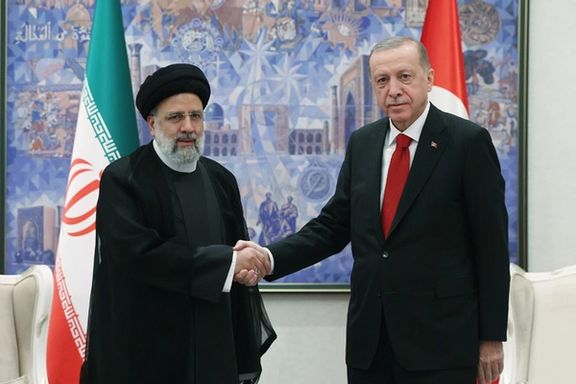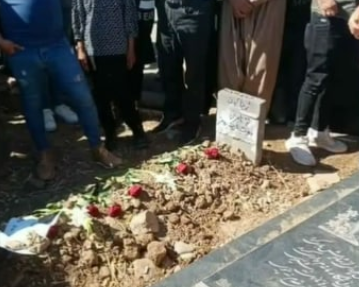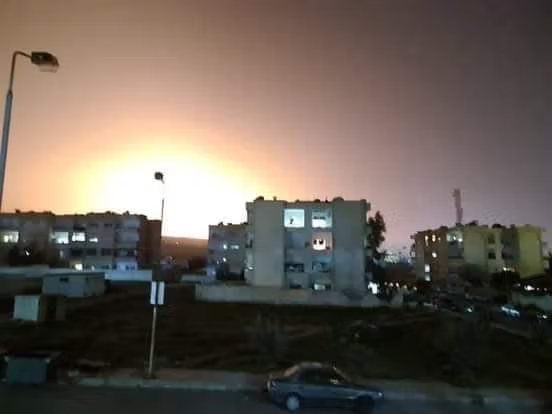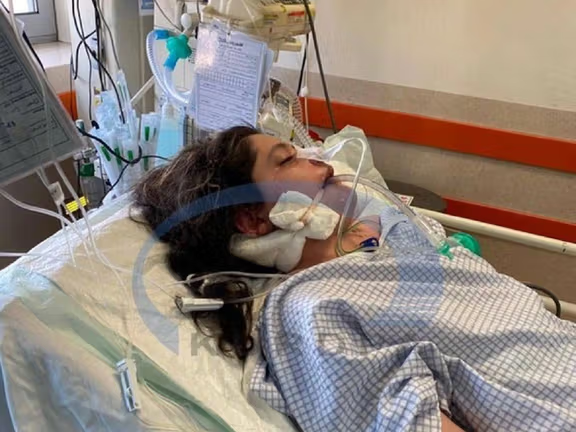Iran Reiterates Position Against Changes In Region’s Borders

Iran’s President Ebrahim Raisi says Tehran is against any change in the historical and geopolitical borders of the region, calling it unacceptable.

Iran’s President Ebrahim Raisi says Tehran is against any change in the historical and geopolitical borders of the region, calling it unacceptable.
Raisi made the remarks during a meeting with his Turkish counterpart Recep Tayyip Erdoğan on the sidelines of the of the 22nd Shanghai Cooperation Organization (SCO) summit in the Uzbek city of Samarkand Friday, in an apparent reference to escalation of decades-old hostilities between neighbors Armenia and Azerbaijan.
“The basis of our policy in the region is that the fate of the countries is determined by themselves and their national sovereignty and territorial integrity are respected,” he said.
Touching on the developments in the South Caucasus, he emphasized Tehran welcomes “the liberation” of Nagorno-Karabakh, and expressed Iran’s readiness to partake in reconstruction projects in the region.
Iran has to an extent supported Armenia in the conflict with Azerbaijan and has warned that it would not allow any seizure of territory from Armenia proper by Baku. Tehran in the past has also expressed alarm at alleged Israeli military presence in Azerbaijan. Foreign Minister Hossein Amir-Abdollahian also warned in October 2021 that Iran will not tolerate "geopolitical change" in the region and at the borders.
In the latest bout of clashes in September, Armenia said that scores of its soldiers had been killed in clashes along the border with Azerbaijan after a sharp escalation in hostilities which prompted Russia and the United States to call for restraint.

Iran’s security forces in the western city of Saqqez have used pellet guns and tear gas against protesters following the burial of Mahsa Amini, a young woman who died in the hands of hijab police.
According to videos obtained by Iran International on Saturday, several protesters were injured when security forces fired at rally outside the building of the governor's office.
People were chanting slogans against the authorities and sought justice for the perpetrators of the crime at the protest rally as well as during her funeral service at a graveyard in her hometown.
The 22-year-old Mahsa Amini who was arrested on Tuesday by the morality police, was taken to hospital two hours later after losing consciousness. She passed away Friday afternoon at Kasra Hospital in northern Tehran. Originally from Saqqez in Kurdistan province, Amini was arrested in her brother’s car on a visit to the capital to see their relatives.
Condemning her death, Amnesty International called on Friday for an investigation of the circumstances leading to her suspicious death.
On Friday night, protests were held in several locations in Tehran -- including outside Tehran's Kasra hospital where she died -- in which people chanted slogans such as “Death to Khamenei,” “Death to Oppressors,” and "We Will Kill Those Who Killed Our Sister".
In recent months government and security agencies have intensified their efforts to pressure women into abiding by the hijab laws and several rounds of anti-hijab civil disobedience campaigns have followed.
Patrols by ‘morality police’ have increased on the streets and videos of violent arrests of women and girls as well as confrontations between people and hijab enforcers.

The US State Department told Iran International that the death of a young Iranian woman in custody of the Islamic Republic’s religious police is “an appalling and egregious affront to human rights.”
Twenty-two-year-old Mahsa Amini died Friday from a head trauma after her arrest by a hijab enforcement patrol on Tuesday, sparking anger and some protests in the capital Tehran.
“Our thoughts are with Mahsa’s family and loved ones,” a State Department spokesperson said in response to our correspondent.
“Women in Iran should have the right to wear what they want, free from violence or harassment,” he added, noting that “Iran must end its use of violence against women for exercising their fundamental freedoms.”
“We call on Iran’s leaders to hold accountable those responsible for Mahsa’s death,” he concluded.
Earlier in the day, US National Security Advisor Jake Sullivan said, “We’re deeply concerned by death of Mahsa Amini who was reportedly beaten in custody by Iran’s morality police. Her death is unforgivable. We’ll continue to hold Iran officials accountable for such human right abuses.”
Her body was transferred to her hometown Saqqez in the Kurdistan province to be buried. A huge crowd gathered at the cemetery, chanting "Death to Dictator" as well as a Kurdish slogan which roughly translates, "Murder Because of Headscarf; How Long Are We Going to Tolerate Such Disaster?"
According to the latest videos published on social media, security forces fired at protesters who gathered in front of the Saqqez governor's office building after her funeral service.

Israel carried out an airstrike on Syria's Damascus International airport and other positions south of the capital the ministry of defense said early on Saturday.
This was the second attack on the airport in a little over two weeks, and the defense ministry said five soldiers were killed and the facilities sustained material damage.
There was no immediate confirmation whether the strike had affected airport operations.
Israel's military said it did not comment on foreign reports.
Israel has intensified strikes on Syrian airports to disrupt Iran's increasing use of aerial supply lines to deliver arms to allies in Syria and Lebanon including Hezbollah, regional diplomatic and intelligence sources told Reuters.
Tehran has adopted air transport as a more reliable means of ferrying military equipment to its forces and allied fighters in Syria, following disruptions to ground transfers.
A senior Israel Defense Forces officer said on Thursday that Hezbollah and other Iran-backed militia groups are withdrawing from areas in Syria that have been targeted by Israel. The apparent withdrawal of these forces from some regions is “a result of the IDF strikes” in recent weeks. He did not say which parts of Syria he was referring to.
Israel has been targeting Iranian weapons supplies since 2017 to prevent Tehran from expanding its foothold in Syria and transferring more weapons to its proxy forces.

People familiar with Iran’s Supreme Leader health situation say Ali Khamenei is gravely ill and is currently on bed rest under observation by a team of doctors, the New York Times reported.
The newspaper on Friday quoted four people familiar with Khamenei’s health condition as saying that all his meetings are cancelled while there have been numerous rumors about his death on social media in recent days.
Iran International had earlier reported about Khamenei absence from the public scene since the beginning of this month, while some pundits said separately that Khamenei has given Raisi authority to make decision over Iran’s nuclear talks with the West.
The octogenarian leader had surgery at a clinic set up at his home and office complex some time last week for bowel obstruction after suffering extreme stomach pains and high fever, one of the people said.
One of the sources said he is currently being monitored around the clock by a team of doctors, claiming that his condition was critical last week, but has improved, and he is currently resting.
The Iranian government has not denied social media reports circulating for more than a week about Khamenei's illness. Meanwhile, his office cancelled two scheduled meetings with the Assembly of Experts members and Basij militia during the past days.
In another development, a picture released by the official news agency IRNA last week about Khamenei's meeting with athletes, turned out to be at last three years old and the agency pulled the story.

The death of a young Iranian woman from a head trauma after her arrest by a hijab enforcement patrol has sparked anger and some protests in the capital Tehran.
The 22-year-old Mahsa Amini who was arrested on Tuesday by the morality police was taken to hospital two hours later from Vozara Detention Center after losing consciousness. She passed away Friday afternoon at Kasra Hospital in northern Tehran. Originally from Saqqez in Kurdistan province, Amini was arrested in her brother’s car on a visit to the capital to see their relatives.
“Mahsa Amini’s death after injuries sustained in custody for an “improper” hijab is appalling. Our thoughts are with her family. Iran must end its violence against women for exercising their fundamental rights. Those responsible for her death should be held accountable,” US Special Envoy for Iran Robert Malley tweeted Friday.
Amnesty International account for the organisation's work on Iran also said in a tweet that the circumstances leading to “the suspicious death in custody” of Mahsa Amini must be criminally investigated.
Iran’s exiled Prince Reza Pahlavi also issued a statement calling the Islamic Republic “misogynistic” and asking Iranians to “stand up against this monstrosity.”
Several videos posted on social media show dozens of people on sidewalks of streets close to the hospital where Amini died chanting slogans such as “We will kill the one who killed our sister”, “Down with Dictator’, and shouted “Scoundrels like Daish” while drivers of the vehicles on the street honked their horns.
Social media users said armed security forces who arrived on motorbikes at Argentine square and around the hospital in its vicinity beat people with batons with no discretion and blocked roads to prevent a protest rally from forming. Unconfirmed reports indicate that at least three people were arrested.
As seen in the videos uploaded on Twitter and Instagram, protesters also chanted against Supreme Leader Ali Khamenei, who has not seen been seen in public recently. Sources familiar with his health situation told New York Times Friday that the 83-year-old ruler fell gravely ill and is currently on bed rest under observation by a team of doctors.
In another social media video people are heard chanting “Death to Khamenei” on rooftops and from their windows in an unspecified neighborhood.
Hours after the announcement of Amini’s death at the hospital, the state television (IRIB) aired CCTV footage of the detention center where Amini had been taken by the morality police. The footage showed her collapsing while apparently arguing with one of the female officers as proof that she had not been subjected to violence at the time of her arrest, but the film is an edited segment, and it cannot be seen if something happened before she collapsed.
Amini’s family members say there was a scuffle at the time of Amini’s arrest. According to her uncle, Amini’s brother who was with her at the time of her arrest had tried to resist but the arresting officers used tear gas.
A photo of the 22-year-old Mahsa Amini on the hospital bed shows her unconscious with very clear signs of bleeding from her right ear. Several doctors including Mahdiar Saeedian, editor of a health magazine, have pointed out on social media that brain strokes do not cause otorrhagia (hemorrhage from ears) which proves that her coma was caused by trauma to the head, possibly at the time of her arrest.
Dr Alan Tofighi, a Paris-based physician and activist, also told Iran International TV that collapsing a few hours after head trauma with no apparent symptoms is very common.
Iran’s government which is now fully controlled by hardliners has adopted a harsher than usual approach amid economic crisis and hardship for tens of millions. Government and military officials have warned the population against disobeying hijab rules and hijab enforcement patrols have detained many women, sometimes violently, on the streets.